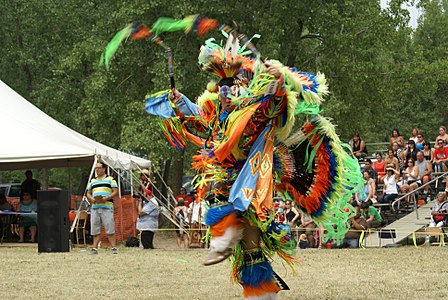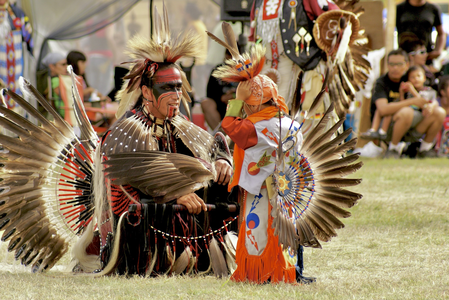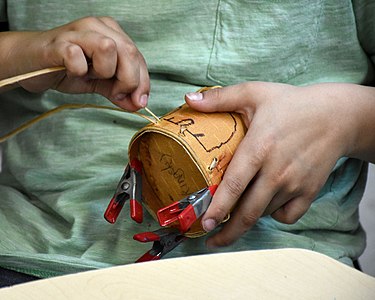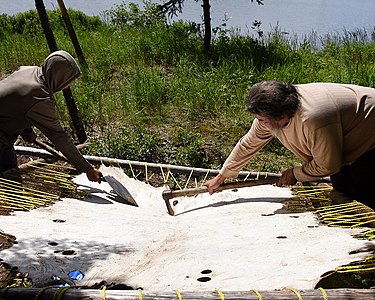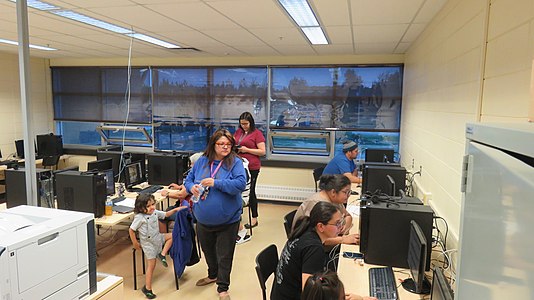|
 |
Wikimedia Canada shares the vision statement of the Wikimedia Foundation: “Imagine a world in which every single human being can freely share in the sum of all knowledge. That's our commitment.”[1]

The main goal of Wikimedia Canada is to diversify, augment and improve the content about Canada on Wikimedia projects and to increase the contribution of Canadians in Wikimedia projects.
To achieve this goal, Wikimedia Canada has identified four priorities for its five years strategic plan 2017-2021:
- Develop and disseminate free knowledge.
- Promote the use of free knowledge resources
- Encourage the development of open knowledge communities across Canada
- Achieve and sustain a high level of corporate maturity
Programs
[edit]| Develop free knowledge about Canadian cultures, languages, history, geography, sports and other fields of knowledge, and increase the diversity of contributors from Canada. |
-
Wikidata workshop in Montreal, Quebec during the International Francophone Contribution Month
-
Wikidata presentation in Montreal, Quebec during the International Day of Open Data
-
One of the regular monthly workshop held at the Cinémathèque québécoise
-
Wikipedia workshop at the Université de Montréal during the #1Lib1Ref campaign
-
Wikipedia presentation with BAnQ Gatineau during the International Archives Day
-
Wikimedia Commons scan-a-thon with BAnQ Vieux-Montréal during the International Archives Day
- Goal
The goal of this program is to develop free knowledge about Canadian cultures, languages, history, geography, sports and other fields of knowledge, mainly on Wikimedia projects, and to increase the quantity and the diversity of contributors from Canada. To achieve this goal, Wikimedia Canada aims at increasing, expanding and strengthening institutional partnerships with Canadian galleries, libraries, archives, museums and universities (GLAMUs) as well as developing the contributor communities in Canada.
- Institutional partnerships

Within this program, Wikimedia Canada will strengthen its existing institutional partnerships and seek to establish new ones, mainly with GLAMUs, and will conduct outreach to the public and those institutions in order to increase the awareness about free knowledge and the Wikimedia projects in Canada. This will mainly be achieved by supporting its members and other volunteers to host contribution workshops and other local activities in partnerships with those GLAMUs with the intent of developing a closer relationship.
Specifically, Wikimedia Canada will continue its very successful partnership with Bibliothèque et Archives nationales du Québec (BAnQ). It will also continue and strenghten its partnerships with Library and Archives Canada, the Association francophone pour le savoir (Acfas), the Cinémathèque québécoise and the Fondation Lionel-Groulx. The potential and the impact of such partnerships have been clearly identified with the activities of the past two years that resulted in an increase in quality content and in new contributors to the Wikimedia projects.
- Collaboration with like-minded organizations
The chapter will also continue to increase its collaboration with the other organizations of the Wikimedia movement in North America and across the Francophonie through WikiFranca in order to share resources and best practices to be more efficient and have a greater impact.
- WikiClubs
Furthermore, Wikimedia Canada will support the development and the growth of diverse communities contributing to open knowledge in Canada, by promoting the creation of WikiClubs across the country and supporting Canadians to develop free content, mainly on Wikimedia projects. The development of strong and diverse communities of volunteers across the country will allow the chapter to have a greater impact and reach with its activities. The chapter also aims at increasing the awareness and the understanding of the Canadian public about open knowledge, free licenses and Wikimedia projects.
Wikimedia Canada will facilitate and enable the emergence of new WikiClubs by linking volunteers with local cultural and knowledge actors such as GLAMUs. For instance, the chapter will use its strong partnership with BAnQ to develop new WikiClubs around their centres in different locations in Quebec.
- Individual support
Wikimedia Canada will also support individual contributors across the country to have access to the resources they need to develop meaningful and quality content for the Wikimedia projects. Specifically, the chapter will help volunteers to have access to references to develop content for Wikipedia.
| Develop Wikimedia projects in the indigenous languages of Canada and increase quality free knowledge about Canadian First Nations, Inuit and Métis. |
-
Fancy dancer during a pow-wow at the Manawan Atikamekw Community, picture uploaded to Wikimedia Commons during the Nitaskinan in pictures contest
-
An adult and a child in traditional regalia during a pow-wow at the Manawan Atikamekw Community, picture uploaded to Wikimedia Commons during the Nitaskinan in pictures contest
-
A volunteer of Wikimedia Canada recording words in Atikamekw language with an elder of the community during Wikimania 2017
-
A photograph of a traditional activity of the Atikamekw First Nation uploaded during the Nistakinan in pictures contest
-
A photograph of a traditional activity of the Atikamekw First Nation uploaded during the Nistakinan in pictures contest
-
A Wikimedia Commons workshops hosted by the Atikamekw Community of Manawan WikiClub
- Goal
This program aims at increasing the quantity and the quality of content on Wikimedia projects in Canadian indigenous languages and about Canadian indigenous peoples by hosting outreach events, training sessions and contribution workshops with indigenous communities. Currently, there is a real knowledge gap on Wikimedia projects about the indigenous peoples of Canada, especially about contemporary communities. Most of the content is outdated or only historical, while those communities are still alive and dynamic today. Wikimedia Canada aims at closing this knowledge gap by empowering the indigenous communities to produce the free content about them themselves.

- Wikipedias in Canadian indigenous languages
Right now, only three Wikipedias in indigenous languages of Canada exist outside the Wikimedia Incubator and only one of them is active, the Wikipetcia Atikamekw Nehiromowin. Futhermore, the most-used messages of the core Mediawiki interface are only translated in one Canadian indigenous language, the Atikamekw language. The success of the Atikamekw First Nation on Wikimedia projects is the result of a Wikimedia Canada's program that started in 2016. The chapter will build upon this success to emulate it with other indigenous linguistic communities across the country. In partnership with the Institut de la recherche scientifique (INRS) and the Université du Québec en Outaouais (UQO), Wikimedia Canada published a toolkit that records all the lessons learned and the best practices identified from the Atikamekw project that will be used to do similar projects with other communities in Canada and that is shared with the Wikimedia movement to be used in other countries.
The intent of those projects is to outreach to indigenous communities and teach them how to create Wikipedias in their languages, how to develop them and how to translate the interface of Mediawiki with the final intent to develop the skills of those communities so they can become autonomous in developing the Wikipedias in their languages. To ensure the success of those projects, the chapter will first seek partnerships with cultural and educational organizations from those communities that will take ownership of the projects from the beginning.
- Collaboration
Wikimedia Canada will continue to partner with other like-minded organizations such as Global Voices in Latin America and the Wikimedians of North American Indigenous Languages User Group to develop a network to share best practices and lessons learned about developing Wikimedia projects in smaller languages that are under-represented on Wikimedia projects and face different challenges than the more established linguistic communities. The success of the project to create the Wikipetcia Atikamekw Nehiromowin has become a model at the international level, as was seen during presentations in the last two Wikimanias.
- Free content about Canadian indigenous peoples
In parallel to the projects to develop Wikimedia projects in Canadian indigenous languages, the outreach events, training sessions and contribution workshops hosted with indigenous communities will also aim at empowering them to develop content about themselves on the bigger Wikimedia projects such as the English and the French Wikipedias. The indigenous communities can add their own knowledge to those encyclopedias, such as the native names of the geographical features for example, which can in turn be translated in all the languages of the world by the larger Wikimedia community.
Wikimedia Canada will also organize and promote workshops and activities to teach indigenous communities how to contribute photographic content to Wikimedia Commons that can be used on the Wikipedias in their languages as well as the Wikipedias in all languages. In particular, the chapter will continue to support the annual "Nitaskinan in pictures" photographic contest on the Atikamekw ancestral territory to document the traditional activities of the Atikamekw people.
- Lingua Libre
Beside developing written and photographic content about the indigenous peoples of Canada on the Wikimedia projects, Wikimedia Canada will continue to use the Lingua Libre initiative to record Canadian indigenous languages and upload the files to Wikimedia Commons. Those files will then be used on Wiktionaries and other Wikimedia projects. For example, an “Introduction to the Atikamekw language” on the French Wikiversity has been developed using those files to teach pronunciation.
- Indigenous WikiClubs
The model of WikiClubs will also be applied to indigenous communities for the development of local indigenous communities of contributors, which is already started with the very active Atikamekw Community of Manawan WikiClub.







